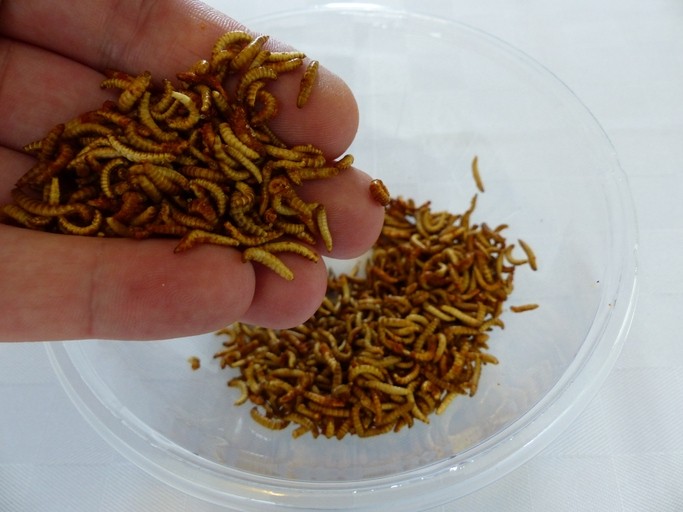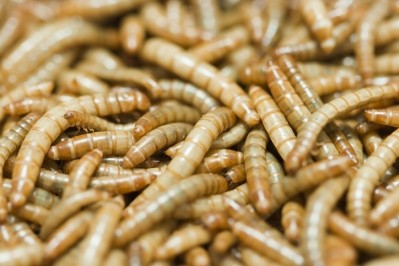Insect protein producer expands operations, wins grant to cut costs

The grant has five main research objectives all aimed at cutting costs for the insect protein producing company, said, said Virginia Emery, Beta Hatch founder and CEO.
“We expect that after the research in the proposal we should be able to ideally be cutting both the costs of facilities and operating costs in half – so huge improvements there,” she added.
Work on the grant objectives is initially focused on redesigning the trays used to raise the company’s mealworms in its vertical farming system, she said.
“I started the business wanting to see insects become part of the food system, which I believe has been one of the missing links,” she told FeedNavigator about starting Beta Hatch.
“We’re growing insects, specifically mealworms, for animal feed,” she said. “The main animals that we’re looking to feed are poultry and aquaculture, but as an ingredient, it’s high protein and high fat, and that would be suitable for all kinds of animals. So we’re excited about the opportunity for insects to become parts of all types of diets.”
Why mealworms?
Unlike some of the insect-based feed companies, Beta Hatch has started its work with mealworms rather than black soldier flies to take advantage of the dry production process, said Emery. The lack of moisture also helps reduce risks in the production system.
“Black soldier flies grow faster, but the nutrient profile of the two insects is different,” she said. “Mealworms tend to be higher in fat and the protein can be a little more digestible, even though they’re a little slower.”
Looking forward, however, there would be interest in expanding the species of insects being raised, she added.
Growing Beta Hatch
As part of its ongoing expansion efforts, Beta Hatch recently finished the construction of its pre-commercial facility, which provides about 5,000 square feet of warehouse space, said Emery.
The firm is already planning for the construction of a commercial space at a location in Cashmere, Washington.
When completed, that facility would be about 30,000 square feet, she said. “The commercial-scale facility is designed to produce about a ton a day … we’ve achieved a ton a month and the next phase of growth is to get closer to a ton a day capacity,” she added.
The technology involved in the production process also has seen some changes and refinement during the growth process, she said.
The company initially was looking at production costs for a ton of insect meal of close to US$14,000, she said. “We’re closer to US$6,000 at the pilot and we’re expecting to significantly drive it down further at the pre-commercial [facility] and a lot more at the commercial as well,” she added.
Refining feed and technology
Much of the product costs tie to the labor required, said Emery. However, that is not the only target for improvement.
“The biggest areas that we’ve been working on refining are in the genetics and the diet … what we’ve been feeding them,” she said. “Those are two of the areas we’ve been emphasizing with a lot of our technology development.”
Currently, the mealworms receive an organic diet, because of customer preference, she said. However, the company also has been exploring the potential to use a range of other feed ingredients with a focus on underused products.
“It’s not useful for our production to displace feed from other animals or food from the food system,” Emery said. “What we’re looking for are what are the feed ingredients, what are the inputs that are low value, or underutilized, or very affordable or that have supply chain challenges so those are the ingredient we’re interested in. We’ve experimented with everything from pea starch and rice bran and fermentation byproducts to some work we did in plastics.”
Initially, the company is focusing on the poultry market based on regulatory approval, she said. However, efforts to expand the use of insect meal in aquaculture are of interest.
“Insects are a fantastic fishmeal replacement,” she said. “Insects can be grown year round can be very predictably produced so there’s an opportunity for us to provide some guaranteed pricing on a several year basis because we control every step of the process.”
In addition to the new facility, Beta Hatch announced earlier this month that it has added Lisa Newman to its team as a new chief operations officer.
“Lisa had a long background in the greenhouse and indoor farming industries – she’s been a farmer her whole life and she has a lot of experience working in greenhouse automation and plant production,” Emery said. “We are a manufacturing business, but we’re also farming so finding that blend of skills was important to us.”
In establishing the position, the company was looking for someone who understood work with living systems, and the challenges of working on an indoor production system, she said.















